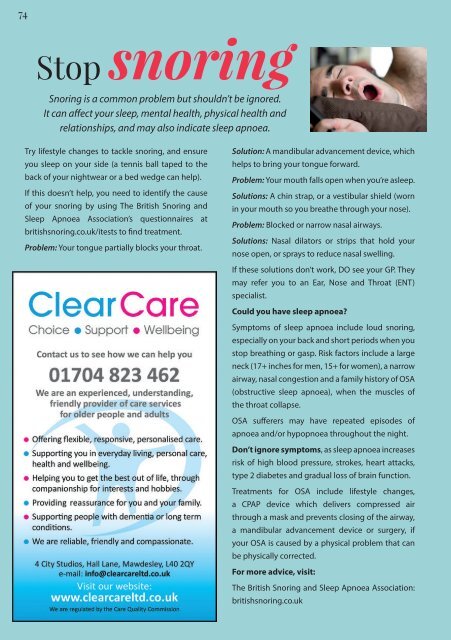Local Life - Wigan - October 2019
Wigan's FREE local lifestyle magazine.
Wigan's FREE local lifestyle magazine.
Create successful ePaper yourself
Turn your PDF publications into a flip-book with our unique Google optimized e-Paper software.
74<br />
Stop snoring<br />
Snoring is a common problem but shouldn’t be ignored.<br />
It can affect your sleep, mental health, physical health and<br />
relationships, and may also indicate sleep apnoea.<br />
Try lifestyle changes to tackle snoring, and ensure<br />
you sleep on your side (a tennis ball taped to the<br />
back of your nightwear or a bed wedge can help).<br />
If this doesn’t help, you need to identify the cause<br />
of your snoring by using The British Snoring and<br />
Sleep Apnoea Association’s questionnaires at<br />
britishsnoring.co.uk/itests to find treatment.<br />
Problem: Your tongue partially blocks your throat.<br />
Solution: A mandibular advancement device, which<br />
helps to bring your tongue forward.<br />
Problem: Your mouth falls open when you’re asleep.<br />
Solutions: A chin strap, or a vestibular shield (worn<br />
in your mouth so you breathe through your nose).<br />
Problem: Blocked or narrow nasal airways.<br />
Solutions: Nasal dilators or strips that hold your<br />
nose open, or sprays to reduce nasal swelling.<br />
If these solutions don’t work, DO see your GP. They<br />
may refer you to an Ear, Nose and Throat (ENT)<br />
specialist.<br />
Could you have sleep apnoea?<br />
Symptoms of sleep apnoea include loud snoring,<br />
especially on your back and short periods when you<br />
stop breathing or gasp. Risk factors include a large<br />
neck (17+ inches for men, 15+ for women), a narrow<br />
airway, nasal congestion and a family history of OSA<br />
(obstructive sleep apnoea), when the muscles of<br />
the throat collapse.<br />
OSA sufferers may have repeated episodes of<br />
apnoea and/or hypopnoea throughout the night.<br />
Don’t ignore symptoms, as sleep apnoea increases<br />
risk of high blood pressure, strokes, heart attacks,<br />
type 2 diabetes and gradual loss of brain function.<br />
Treatments for OSA include lifestyle changes,<br />
a CPAP device which delivers compressed air<br />
through a mask and prevents closing of the airway,<br />
a mandibular advancement device or surgery, if<br />
your OSA is caused by a physical problem that can<br />
be physically corrected.<br />
For more advice, visit:<br />
The British Snoring and Sleep Apnoea Association:<br />
britishsnoring.co.uk


















